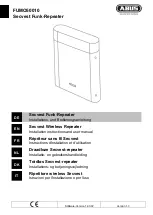
3
Technical Data
PR216-219-508-01
Effective March 2017
Installation and user manual for the
BiWire / Conventional Repeater
Introduction
Purpose
This manual is intended as a guide for the installation and commis-
sioning of the BiWire / Conventional Repeater panel . The content
of this guide is intended to assist the user to install a fire alarm
system and does not specify the detailed design of the product .
The guide assumes a reasonable level of competency with this
type of system .
The installation of this system can only be carried out by a compe-
tent person with relevant current training and experience, with
access to requisite tools, equipment and information (as stipulated
by BS5839) .
The design has been carried out in accordance with a quality
management system, which incorporates a set of rules for the
design of all elements of the Indication Equipment (IE) and Power
Supply Equipment (PSE) .
The components of the IE and PSE have been selected for the
intended purpose, and are expected to operate within their speci-
fication when the environmental conditions outside the cabinet of
the IE / PSE comply with class 3k5 of EN 60721-3-3:1995 .
The BiWire/Conventional Repeater Panel
The BiWire/Conventional Repeater Panel mimics the visual and
audible indications of the Fire panel it is connected to . This is a
purely passive repeater panel so it is not possible to send instruc-
tions to the Fire panel to perform actions such as Sound Alarms,
Silence Alarms, or Reset . Each repeater panel comes with an
integral power supply and battery backup so there is no power
requirements from the main Fire panel .
Indication Equipment (IE)
The panel enclosure is constructed from PC ABS components .
The front cover is hinged at the bottom and is secured at the top
of the panel by two retaining screws . On the in-side of the panel a
sliding PCB tray makes it easy to remove the tray without touching
the PCB . The back box houses the PSE, the stand-by batteries and
has 29 x 20mm cable access points . Terminal blocks are positioned
to enable ease of connection . Figure 1 shows the dimensions of
the panel .
Figure 1. BiWire/Coventional Repeater Panel Dimensions



































